- Home
- Will Hobbs
Never Say Die Page 4
Never Say Die Read online
Page 4
Ryan asked if I’d had lunch and I told him I hadn’t. We went to the Mackenzie Hotel’s restaurant. I ordered a hamburger and fries with gravy. First thing, Ryan asked about my grandfather. I said, “He’s hanging on one day at a time.”
“I’m sorry you’re losing him, but I’m so glad you could come. Have you been in Ivvavik National Park before, over in the Yukon Territory?”
“Only on the coast, not in the mountains.”
He was hoping I’d say more. When I didn’t, Ryan said, “Ivvavik’s remoteness is half of the appeal. It’s nothing like our national parks back home. When the park office is two hours away by airplane, that tells you a lot. As I understand it, there are no communities on the entire north slope of the Yukon Territory. Not a single person lives there year-round.”
Our food arrived. My hamburger beat the fast-food burgers I’d had in Inuvik after basketball games, but it didn’t have the flavor of ground caribou. I went heavy on the ketchup.
My brother was a fish out of water, and didn’t know where to start. At least he wasn’t going to ask, “Do you hunt?”
He hesitated, then asked, “Your branch of the Inuit is called the Ee-noo-vee-al-oo-it, right?”
Close enough, I thought. I nodded my agreement as I dug into my fries.
“If I got this right, Inuit means ‘the People.’ What does Inuvialuit mean?”
“It’s hard to translate into English. ‘The Real People’ is pretty close.”
“Do you speak the language?”
“A little. We take it at school.”
Ryan eased off on his questions and finished his sandwich. Soon as he paid the bill, we got into his pickup to go shopping. Ryan had a big cooler and three metal boxes he called “ammo cans” in the bed of the truck, all of them empty. We were going to spend the rest of the afternoon shopping for the fresh food and other stuff to fill them up.
Ryan drove us to the Northmart. It was a hot day with hardly any wind and the mosquitoes were pretty bad. It was good to get inside. We started in the clothing section. My brother bought that bug shirt for me. Next stop was sporting goods. Ryan was asking if I’d brought along a fishing pole. I said no, and he picked out a rod and reel for me, and some lures. He’d gotten himself a fishing license at the park office and figured I didn’t need one, being Native. I told him he was right.
Ryan asked what else I could use. “Nothing I can think of,” I said. I helped him find things as he checked off his list. Back at his pickup in the hotel’s parking lot, we packed the food into his cooler and metal boxes. We had supper down the street at the Eskimo Inn.
After that we went back to the hotel so Ryan could look over my stuff. As we entered my room, Ryan’s eyes went from my duffel bag and small backpack on the bed to the hard plastic rifle case standing in the far corner by the closet. “That doesn’t look like a guitar case,” he said.
“That’s a rifle case. I brought my rifle.”
“Hmmm …,” he said.
I asked if that was a problem.
“Let’s talk about it later,” he said, looking away. “We better keep on task while the stores are still open.”
We’d been doing so well, but now I wasn’t so sure.
Ryan had me spread my stuff all over the bed and around the floor. As he checked out the clothes, he started making a list. There was only one thing I could think about, and that was my rifle. When I came out and asked again if he had a problem with it, he said, “Firearms aren’t allowed in Ivvavik National Park. I’ve got all the info from the park in my room if you want to see it.”
“Hey, it’s okay,” I said with a smile. “I can have a rifle even if you can’t. The park was only created with our agreement. The Inuvialuit said it was okay as long as we got to have the exclusive hunting rights. You can ask at the office. That’s the way it is, so it’s no worries.”
“I didn’t know that, but I don’t doubt it.”
That should have settled it about my rifle. Still, Ryan looked unhappy. He wasn’t saying why.
“Hey, Ryan,” I said with a grin, “you said the fresh food, like the meat, was only for the first week or ten days. I could get us a caribou later on. You should take advantage of me being indigenous.”
“I’ve got canned meat for later.”
Trying to keep it light didn’t seem to be working. “Are you against hunting?”
“Not at all. I just didn’t grow up with it.”
“So, what’s the problem?”
“The bears.”
This made no sense at all. “The bears? The bears are the main reason I brought my rifle. Believe me, we need a rifle for protection.”
“I’ve brought along plenty of protection—pepper spray, bear bangers, and an air horn.”
“What are bear bangers?”
“They imitate the sound of a gun.”
“A real gun would scare them better.”
Again, he hesitated. “Statistically, traveling in grizzly country isn’t nearly as dangerous as people think, especially if you take every precaution and know how to behave if you get charged. You’re more likely to get hit by lightning than attacked by a bear.”
“Not up here. Your chances of getting hit by lightning are about zip.”
“I know … lightning was unknown in the Arctic, but now it’s even starting fires.”
“Like where?”
“North slope of Alaska, just last summer. The swath of tundra that burned was twenty miles wide and forty miles long. The frozen ground underneath melted and is releasing huge quantities of methane gas into the atmosphere. As the Arctic warms, you’ll see more lightning, and wildfires over here, too.”
“Maybe so, but we were talking about bears, and my rifle. What if a grizzly charges you, and all you’ve got is pepper spray?”
“Pepper spray will disable a bear just fine, without harming it. Nine times out of ten, the experts all agree, it’s only a bluff charge. They’ll stop ten or fifteen feet short of you. A man with a rifle will shoot before they get that close.”
“Of course he would. If it’s not a bluff, it would take the bear about half a second to cover those last ten or fifteen feet.”
“Everything I’ve read says the man with the rifle who shoots a charging bear seldom kills it outright. Usually he only wounds it. And a wounded bear is going to retaliate—maul you and maybe kill you. Shooting it actually makes you less safe.”
“I wouldn’t injure the bear. I’m a really good shot.”
“But would you wait until the last second?”
“No way.”
“That’s what I’m afraid of—killing a bear that was only bluffing.”
“Have you ever been charged by a grizzly bear, Ryan?”
“No, but I’ve been around them in Wyoming and Montana, in Alaska, and last summer in the barren lands east of here.”
I didn’t say anything. It was irritating to hear him call the tundra “the barren lands.” People who aren’t from here came up with that. Just because the tundra doesn’t have trees on it doesn’t mean it’s barren. Tundra is a living carpet of hundreds of tiny plants, not barren at all. Barren-ground grizzlies, to my way of thinking, should rightly be called tundra grizzlies.
Ryan broke the silence. “I like our chances without a gun, Nick. Listen to this. For the last twenty-plus years, the Arctic River Company out of Whitehorse has been taking people down the Firth, three trips every summer. They’ve never had a firearm along—they take the same protection I’m talking about—and they’ve never had a bear injury. The same goes for the few private parties that raft the Firth every summer. There’s never been a mauling on the Firth River.”
“There’s a first time for everything,” I countered. “We never go out on the land—or the ice—without a rifle.”
“Hey, Nick, I hear what you’re saying and I respect that. My father—our father—felt the same way I do when he kayaked the Northwest Passage. He had a number of encounters with barren-ground grizzlies and one wit
h a polar bear. He didn’t take a rifle along for the same reason I don’t. If it came down to it, he wasn’t willing to kill a bear, and neither am I.”
“I still don’t get it. Why not?”
“It’s their world, not ours. There have to be a few places left where we aren’t the top dog.”
“I won’t use the rifle unless I really have to. That’s okay if you can’t kill a bear. I’d do it for you.”
I could hear the wheels grinding. He scratched his beard and said, “If you killed a bear on my account, I would be responsible.”
“The park wouldn’t think that if I was the one who killed it.”
“I know they wouldn’t, but I would.”
I hesitated. I’m slow to anger but this was a bit much. “You’re saying you don’t want me to come unless I don’t bring my rifle?”
“I wouldn’t put it that way. It means the world to me to have you along. I’m sorry if this sounds crazy to you.”
“It’s more like, it doesn’t make sense.”
“We’re coming from very different points of view.”
“That’s for sure,” I said, and looked at the floor. I couldn’t talk about it anymore. I was so upset, I grabbed my baseball cap, sunglasses, and mosquito repellent, and bolted from the room.
“Nick, I’m sorry, we’ll do fine,” Ryan called down the hallway. I was already in the lobby and didn’t look back.
I wandered through the streets of Inuvik and down to the river, where a barge was unloading. It took me an hour just to settle down, a couple more hours to wrestle with myself over what to do. I didn’t want to call home and ask my mother. This was my decision to make. Was it worth the risk?
My mother wouldn’t like the idea of me being out on the land for weeks without my rifle. Jonah would say it was pure foolishness.
Still, this was my one chance to have a brother in my life. My mother and grandfather had thought that might be a good thing, and so did I.
There’s never been a mauling on the Firth River, I told myself.
I walked up the hill and back to the door of the hotel. It was midnight, with the sun suspended above the north end of the street. Back in my room, I set my alarm. I was going. Unless I went, how was I going to have any stories to tell Jonah about his hunter’s paradise?
Morning came brutally early. Ryan hadn’t changed his mind. My rifle stayed behind in an old bank vault the hotel used to store valuables.
8
NO WORRIES, JUST KIDDING
Out at the airport, we headed for the hangar of Red Wiley Air Charters. Red greeted us with, “Howdy, boys,” and told us to help ourselves to the doughnuts and coffee. The legendary bush pilot was wearing the only outfit I had ever seen him in: beat-up cowboy hat, jumpsuit, and cowboy boots.
Red walked with a limp and spoke with a Texas accent that was still going strong after decades in the North. He was probably the only person in all of northwest Canada that everybody knew on sight. Red had been flying out of Inuvik and into the remote communities for a long, long time. Now and again I would see him at our Northern Store in Aklavik.
Of course he wouldn’t know me. I hung back with a doughnut while the two of them made small talk. Pretty quick, the old bush pilot caught my eye and said, “How’s Jonah?”
“Hanging on,” I said, kind of startled.
“Great hunter, even a better man.”
“Thanks. I didn’t know you knew him.”
“Met him a couple of times. Admired him from afar. People will tell of his deeds for a long, long time.”
Ryan backed his pickup into Red’s hangar, close to the mountain of gear he had dropped when he drove in from Arizona—the rolled-up raft and all that went with it, no end of canned food, and all the camping stuff. We shuttled everything out to the bush plane, a twin-engine Otter, and unloaded onto the tarmac.
Then we waited. I found myself chewing a fingernail, which isn’t like me. I wasn’t the only one who was nervous. Ryan kept studying the gear, his forehead bunched up like pressure ridges out on the pack ice. He handed me a butane lighter. I told him I already had a couple. “Keep this one in your pocket,” he said.
Finally Red appeared at the door of his office. He put on his sunglasses and limped in our direction. He was famous for having walked away from four crashes.
With a glance at the gear, Red said, “Let’s load her up and make history, boys!”
A short while later we were airborne. Up front next to Red, Ryan snapped dozens of pictures as we flew west across the wide delta of the Mackenzie, pausing only to exclaim “Amazing!” and “Awesome!” and suchlike.
This was my first time to see the delta from the air. I spied some of my favorite places to trap muskrats and the exact spot where I got that moose just lately. “Aklavik!” my brother cried, fifteen minutes into the flight. I almost wished I hadn’t insisted he take the copilot’s seat, after Red had offered it to me.
Our pilot made sure I got a good look at home. I heard the shutter of Ryan’s camera whirring. Looking right down on the airstrip and the school and Jonah’s house, I nearly lost it. Had I made the right decision?
About ten minutes later we passed over that invisible line between the Northwest Territories and the Yukon Territory. I was keeping my eyes peeled for caribou as we flew surprisingly low over the rolling ups and downs of the treeless tundra, green as green can be.
An hour and a half into the flight, Red finally pulled back on the yoke, and we began to climb. The British Mountains in the heart of Ivvavik National Park lay dead ahead. “Hey, Red,” I asked through the intercom, “how come you fly your Otter so close to the ground?”
“Because I’m afraid of heights.”
Was he kidding? I really couldn’t tell.
Now I was looking down on a jigsaw puzzle of the rugged British Mountains. I didn’t like the sound of the name. They should be called the name that they’d gone by for a thousand years and more, before the Europeans made up their own. Jonah would have known our names for the British Mountains and the Firth River. I wished I had asked him.
Below the rounded mountaintops, the steep slopes were clad with a carpet of bright green alpine tundra. The long hours of sunshine the last couple months had melted most of the snow. What remained made white patches on the slopes facing north. I was surprised to see stunted spruce trees growing on the lower flanks of the south-facing slopes. Except for the delta of the Mackenzie, warmed by the river water, the Arctic this far north is too cold for trees. The mountains, I figured, must shield these trees from the winter blasts blowing off the frozen ocean.
Looking nearly straight down out of my window, I spied a herd of big-racked caribou bulls. There were maybe a hundred of them, headed north on their way down a rocky slope. The sight of them had my hunter’s heart racing. Mature bulls make their own migration north weeks after the cow caribou head for the calving grounds. The bulls are both lazy and smart. They wait until the snow melts and the traveling gets easier. They catch up with the herd in their own good time.
Minutes short of the Alaska border, we came in sight of a major river valley cutting north through the British Mountains, which seemed to run in rows from east to west. “There’s your Firth River, boys,” Red Wiley announced.
Red circled around and zeroed in on the upper valley of the Firth River. At the last, it felt like the ground was flying up. We bounced hard on the dry tundra only a couple hundred feet from the river. A couple more bounces on the Otter’s balloon tires, and we were down on dry land.
The day was hot, sunny, windless, and muggy—ideal conditions if you’re a mosquito. I was barely out of the airplane and they were on me, frantic for a blood meal. I hit the ground wearing my new bug shirt with the hood up and the mosquito netting zipped shut across my neck. My Carhartt jeans were bug-proof as well. All those mozzies could do was whine.
Above me at the side door, Ryan began to hand the gear down. I shuttled the gear well clear of the airplane and returned for the next load f
ast as I could.
Red got out of the airplane “to see a man about a horse,” as he put it. When he got back he told us that this exact spot was where all the Firth River trips launched, and today, June 15, was the traditional opening day. The Arctic River Company out of Whitehorse had always launched the first of their three trips on this date. They weren’t running the Firth at all this summer, on account of the bad economy. Only enough people to fill one trip had signed up. The company didn’t make any money unless they ran all three.
“There’s a chance you’ll be seeing a man and his wife from Montana,” Red told us. “I’m scheduled to fly them in here nine days from now. Whether they actually show up … a lot of times the private parties don’t.”
It hit me how little I knew about what I was in for. There wasn’t going to be a single human being within two hundred miles of us. Being out on the land with Jonah was one thing. Being out on the land with Ryan for three weeks or more was totally a leap of faith.
“I’ve never had a party stay out near as long as you’re talking about,” Red said to Ryan.
“Wildlife photography takes nothing but time.”
“Sure, but I’m not good with waiting to hear from you. Your sat phone might go on the fritz or get dropped in the river. Give me a date and time of day, weather permitting, for picking you up at Nunaluk Spit.”
“Okay, sure,” Ryan said. “We’ll look for you at ten a.m. on July fifteenth on the Nunaluk Spit.”
I fought the urge to climb back into that plane and fly home. A couple minutes later our pilot revved his engines and leaned out his cockpit window to give us a salute. Ryan took pictures as the bush plane rumbled down the tundra on those big balloon tires.
The Otter took off effortlessly, almost jumping into the air. We watched until it disappeared over the mountain. Then we turned to hauling the gear to the shore of the crystal-clear river. I scanned the valley and eyed the mountains all around. Without my rifle, I had never felt so small.
A short walk downstream from where Ryan was pumping up the raft, I came across huge tracks in the mud, unmistakably grizzly. “Hey, Ryan,” I called. “Come check this out.”

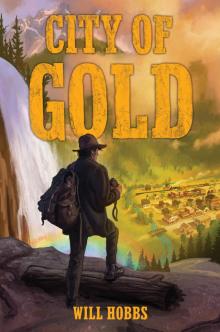 City of Gold
City of Gold Kokopelli's Flute
Kokopelli's Flute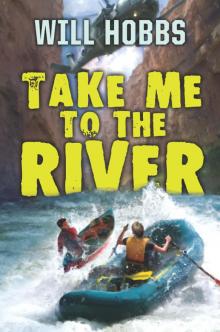 Take Me to the River
Take Me to the River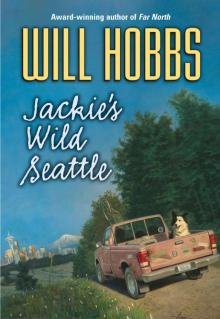 Jackie's Wild Seattle
Jackie's Wild Seattle The Maze
The Maze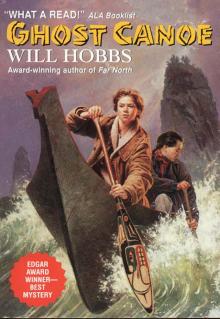 Ghost Canoe
Ghost Canoe Never Say Die
Never Say Die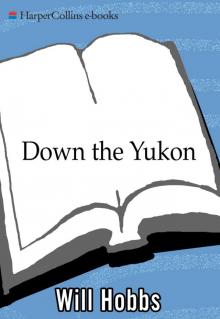 Down the Yukon
Down the Yukon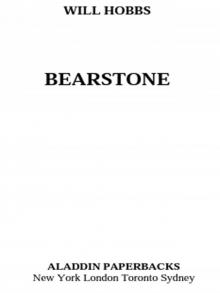 Bearstone
Bearstone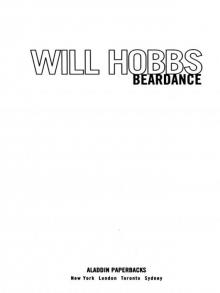 Beardance
Beardance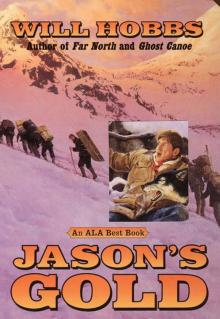 Jason's Gold
Jason's Gold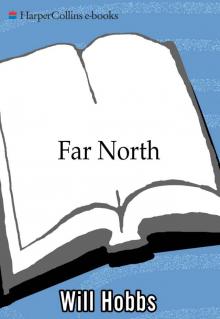 Far North
Far North The Big Wander
The Big Wander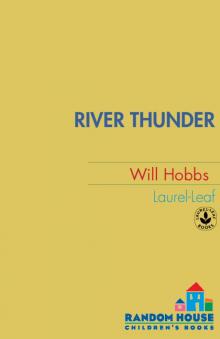 River Thunder
River Thunder Downriver
Downriver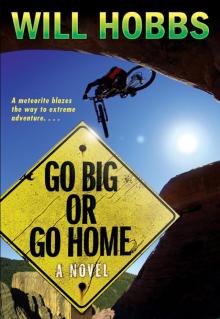 Go Big or Go Home
Go Big or Go Home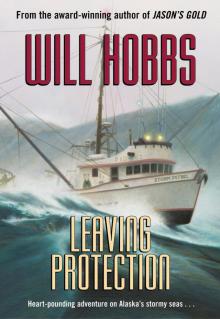 Leaving Protection
Leaving Protection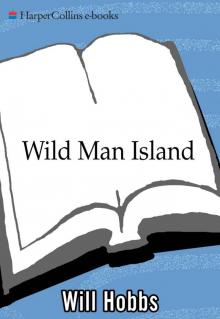 Wild Man Island
Wild Man Island